Schmitt C.B. (ed.) The Cambridge History of Renaissance Philosophy
Подождите немного. Документ загружается.

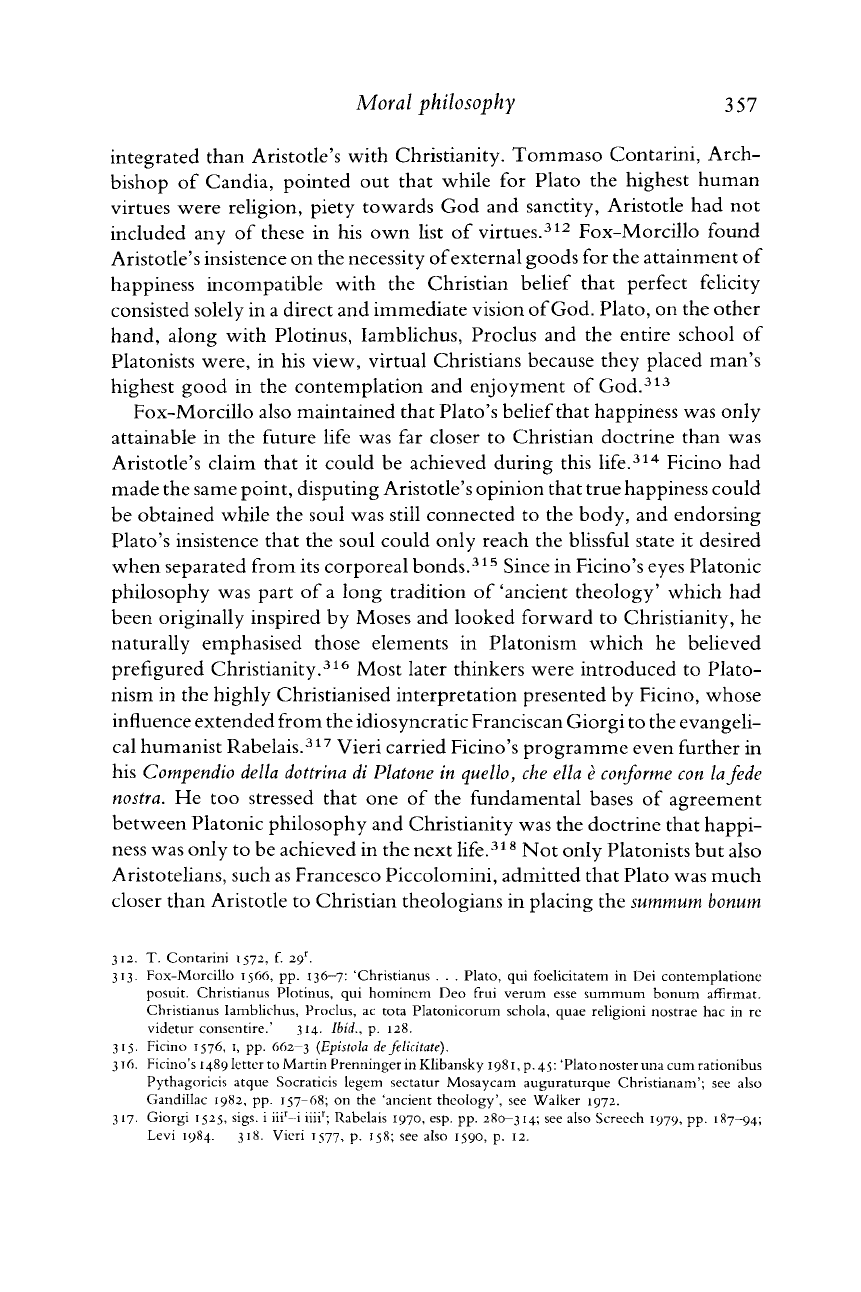
Moral philosophy
357
integrated
than
Aristotle's with Christianity. Tommaso Contarini,
Arch-
bishop of Candia, pointed out
that
while for Plato the highest human
virtues were religion, piety towards God and sanctity, Aristotle had not
included any of these in his own list of virtues.
312
Fox-Morcillo found
Aristotle's
insistence on the necessity
of
external goods for the attainment of
happiness incompatible with the Christian belief
that
perfect felicity
consisted solely in a direct and immediate vision
of
God.
Plato, on the other
hand, along with Plotinus, Iamblichus, Proclus and the entire school of
Platonists were, in his
view,
virtual Christians because they placed man's
highest good in the contemplation and enjoyment of God.
313
Fox-Morcillo
also maintained
that
Plato's
belief
that
happiness was only
attainable in the future
life
was far closer to Christian doctrine
than
was
Aristotle's
claim
that
it could be achieved during this
life.
314
Ficino had
made the same point, disputing Aristotle's opinion
that
true
happiness could
be obtained while the soul was still connected to the body, and endorsing
Plato's insistence
that
the soul could only reach the blissful state it desired
when separated from its corporeal bonds.
315
Since in Ficino's eyes Platonic
philosophy was
part
of a long tradition of 'ancient theology' which had
been originally inspired by Moses and looked forward to Christianity, he
naturally emphasised those elements in Platonism which he believed
prefigured Christianity.
316
Most later thinkers were introduced to Plato-
nism in the highly Christianised interpretation presented by Ficino, whose
influence extended from the idiosyncratic Franciscan Giorgi to the evangeli-
cal
humanist Rabelais.
317
Vieri
carried Ficino's programme even further in
his Compendio della dottrina di Platone in quello, che ella é conforme con lafede
nostra. He too stressed
that
one of the fundamental bases of agreement
between Platonic philosophy and Christianity was the doctrine
that
happi-
ness was only to be achieved in the next
life.
318
Not only Platonists but also
Aristotelians,
such as Francesco Piccolomini, admitted
that
Plato was much
closer
than
Aristotle to Christian theologians in placing the
summum
bonum
312. T.
Contarini
1572, f. 29
r
.
313.
Fox-Morcillo
1566, pp.
136-7:
'Christianus
. . .
Plato,
qui
foelicitatem
in Dei
contemplatone
posuit.
Christianus
Plotinus,
qui
hominem
Deo
frui
verum
esse
summum
bonum
affirmat.
Christianus
Iamblichus, Proclus,
ac
tota
Platonicorum
schola,
quae
religioni
nostrae
hac in re
videtur
consentire.'
314. Ibid., p. 128.
315.
Ficino
1576, i, pp.
662-3
[Epistola de felicitate).
316.
Ficino's
1489
letter
to
Martin
Prenninger
in
Klibansky
1981, p. 45:
'Plato
noster
una cum
rationibus
Pythagoricis
atque
Socraticis
legem
sectatur
Mosaycam
auguraturque
Christianam';
see
also
Gandillac
1982, pp.
157-68;
on the
'ancient
theology',
see
Walker
1972.
317.
Giorgi
1525,
sigs.
i
iii
r
-i
iiii
r
;
Rabelais
1970, esp. pp.
280-314;
see
also
Screech
1979, pp.
187-94;
Levi
1984. 318.
Vieri
1577, p. 158; see
also
1590, p. 12.
Cambridge Histories Online © Cambridge University Press, 2008
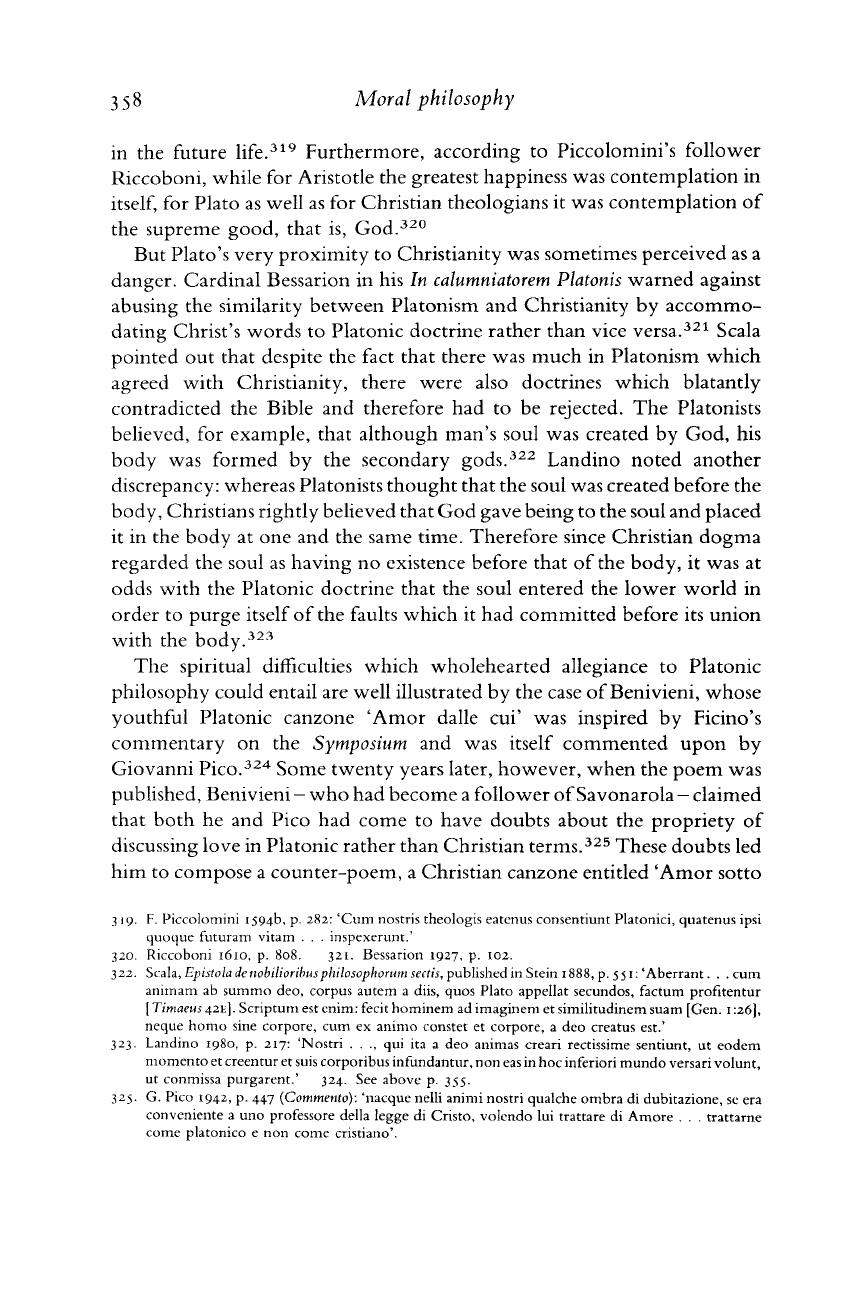
358
Moral philosophy
in
the
future
life.
319
Furthermore, according
to
Piccolomini's follower
Riccoboni,
while
for
Aristotle
the
greatest happiness
was
contemplation
in
itself,
for
Plato
as
well
as for
Christian theologians
it was
contemplation
of
the supreme good,
that is,
God.
320
But
Plato's very proximity
to
Christianity was sometimes perceived
as a
danger. Cardinal Bessarion
in his In
calumniator em Platonis warned against
abusing
the
similarity between Platonism
and
Christianity
by
accommo-
dating Christ's words
to
Platonic doctrine
rather
than
vice
versa.
321
Scala
pointed
out that
despite
the
fact
that
there
was
much
in
Platonism which
agreed with Christianity,
there
were also doctrines which blatantly
contradicted
the
Bible
and
therefore
had to be
rejected.
The
Platonists
believed,
for
example,
that
although man's soul
was
created
by God, his
body
was
formed
by the
secondary gods.
322
Landino noted another
discrepancy: whereas Platonists thought
that the
soul was created before
the
body,
Christians rightly believed
that
God gave being
to the
soul
and
placed
it
in the
body
at one and the
same time. Therefore since Christian dogma
regarded
the
soul
as
having
no
existence before
that of the
body,
it was at
odds with
the
Platonic doctrine
that the
soul entered
the
lower world
in
order
to
purge itself
of the
faults which
it had
committed before
its
union
with
the
body.
323
The
spiritual difficulties which wholehearted allegiance
to
Platonic
philosophy could entail
are
well
illustrated
by the
case
of
Benivieni,
whose
youthful Platonic canzone 'Amor dalle
cui' was
inspired
by
Ficino's
commentary
on the
Symposium
and was
itself commented upon
by
Giovanni
Pico.
324
Some twenty years later, however, when
the
poem
was
published, Benivieni
—
who
had
become
a
follower
of
Savonarola
—
claimed
that
both
he and
Pico
had
come
to
have doubts about
the
propriety
of
discussing love
in
Platonic
rather
than
Christian terms.
325
These doubts
led
him
to
compose
a
counter-poem,
a
Christian canzone entitled 'Amor sotto
319.
F. Piccolomini 1594b, p. 282: 'Cum
nostris
theologis eatenus consentiunt Platonici, quatenus ipsi
quoque futuram vitam . . . inspexerunt.'
320. Riccoboni 1610, p. 808. 321. Bessarion 1927, p. 102.
322. Scala,
Epistola
de
nobilioribusphilosophorum seeds,
published in Stein 1888, p. 551: 'Aberrant. . . cum
animam ab summo deo, corpus autem a diis, quos Plato appellat secundos, factum profitentur
[
Timaeus
42E]. Scriptum est enim: fecit hominem ad imaginem et similitudinem suam [Gen.
1126],
neque homo
sine
corpore, cum ex animo constet et corpore, a deo creatus est.'
323. Landino 1980, p. 217: 'Nostri . . ., qui ita a deo animas creari rectissime sentiunt, ut eodem
momento et creentur et
suis
corporibus infundantur, non eas in hoc inferiori mundo versari volunt,
ut
conmissa purgarent.' 324. See above p. 355.
325.
G. Pico 1942, p. 447
(Commento):
'nacque nelli animi nostri qualche ombra di dubitazione, se era
conveniente a uno professore della legge di Cristo, volcndo lui trattare di Amore . . . trattarne
come platonico e non come cristiano'.
Cambridge Histories Online © Cambridge University Press, 2008
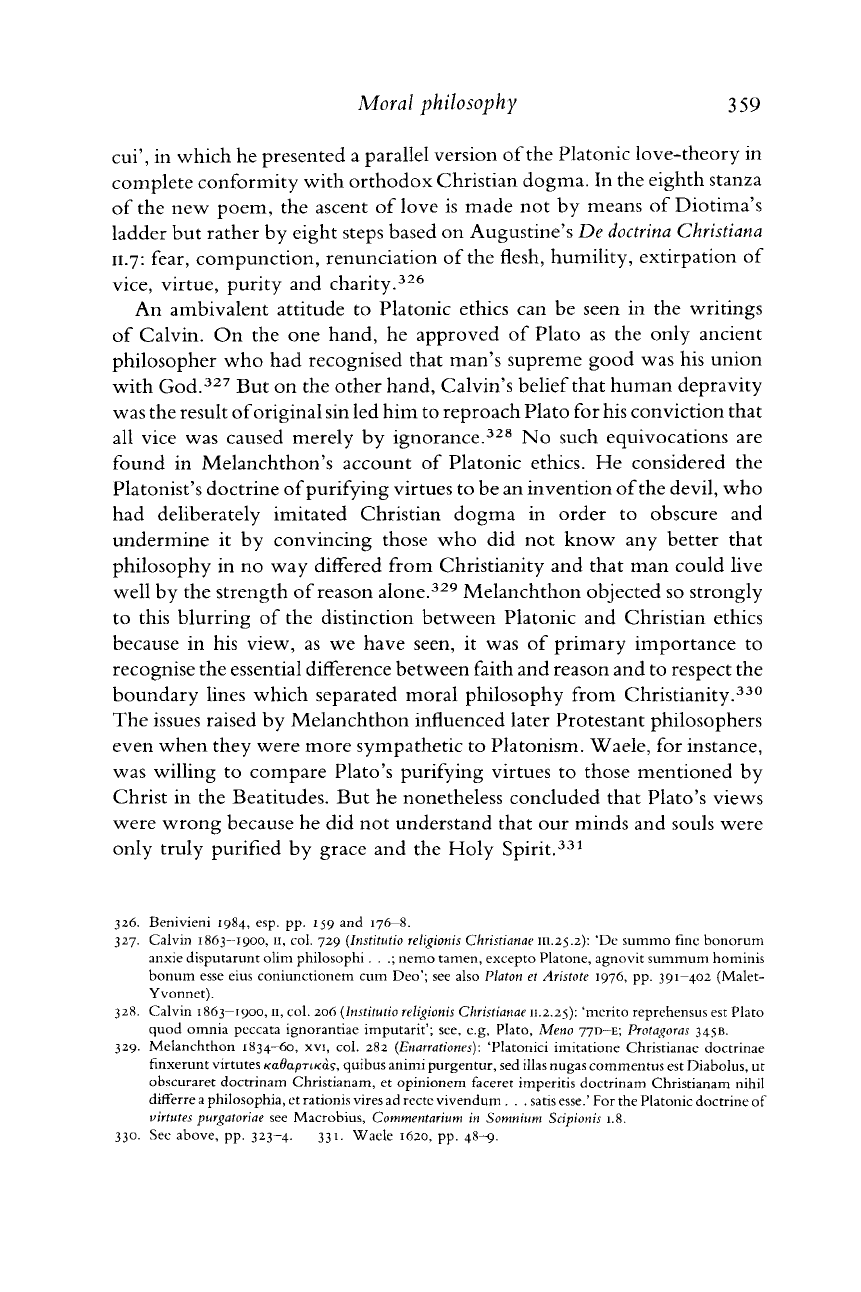
Moral philosophy
359
cui',
in
which
he
presented
a
parallel version
of
the Platonic love-theory
in
complete conformity with orthodox Christian dogma.
In the
eighth stanza
of
the new
poem,
the
ascent
of
love
is
made
not by
means
of
Diotima's
ladder
but
rather
by
eight steps based
on
Augustine's
De
doctrina Christiana
II.7:
fear, compunction, renunciation
of the
flesh, humility, extirpation
of
vice,
virtue, purity
and
charity.
326
An
ambivalent
attitude
to
Platonic ethics
can be
seen
in the
writings
of
Calvin.
On the one
hand,
he
approved
of
Plato
as the
only ancient
philosopher
who had
recognised
that
man's supreme good
was his
union
with
God.
327
But on the
other hand, Calvin's
belief
that
human depravity
was
the
result
of
original sin led
him to
reproach Plato
for
his conviction
that
all
vice
was
caused merely
by
ignorance.
328
No
such equivocations
are
found
in
Melanchthon's account
of
Platonic ethics.
He
considered
the
Platonist's doctrine
of
purifying
virtues
to be an
invention
of
the
devil,
who
had deliberately imitated Christian dogma
in
order
to
obscure
and
undermine
it by
convincing those
who did not
know
any
better
that
philosophy
in no way
differed from Christianity
and
that
man
could
live
well
by the
strength
of
reason alone.
329
Melanchthon objected
so
strongly
to this blurring
of the
distinction between Platonic
and
Christian ethics
because
in his
view,
as we
have seen,
it was of
primary importance
to
recognise
the
essential difference between faith
and
reason
and to
respect
the
boundary lines which separated moral philosophy from Christianity.
330
The
issues raised
by
Melanchthon influenced later Protestant philosophers
even
when they were more sympathetic
to
Platonism. Waele,
for
instance,
was
willing
to
compare Plato's purifying virtues
to
those mentioned
by
Christ
in the
Beatitudes.
But he
nonetheless concluded
that
Plato's
views
were wrong because
he did not
understand
that
our
minds
and
souls were
only
truly purified
by
grace
and the
Holy Spirit.
331
326.
Benivieni 1984, esp. pp. 159 and
176-8.
327.
Calvin
1863-1900, 11, col. 729
(Institutio
religionis Christianae
m.25.2): 'De summo fine bonorum
anxie disputarunt olim philosophi. . .; nemo tarnen, excepto Platone, agnovit summum hominis
bonum
esse
eius
coniunctionem cum Deo'; see also
Platon
et
Aristote
1976, pp. 391-402 (Malet-
Yvonnet).
328.
Calvin
1863-1900,11,
col. 206
(Institutio
religionis Christianae 11.2.25):
'merito reprehensus est Plato
quod omnia peccata ignorantiae imputarit'; see, e.g, Plato,
Meno 77D-E; Protagoras
345B.
329.
Melanchthon 1834-60, xvi, col. 282
(Enarrationes):
'Platonici imitatione Christianae doctrinae
finxerunt virtutes
KadapriKas,
quibus animi purgentur, sed illas nugas commentus est Diabolus, ut
obscuraret doctrinam Christianam, et opinionem faceret impends doctrinam Christianam nihil
differre a philosophia, et rationis vires ad recte vivendum . . . satis
esse.'
For the Platonic doctrine of
virtutes
purgatoriae
see Macrobius,
Commentarium
in Somnium
Scipionis
1.8.
330. See above, pp. 323-4. 331. Waele 1620, pp. 48-9.
Cambridge Histories Online © Cambridge University Press, 2008
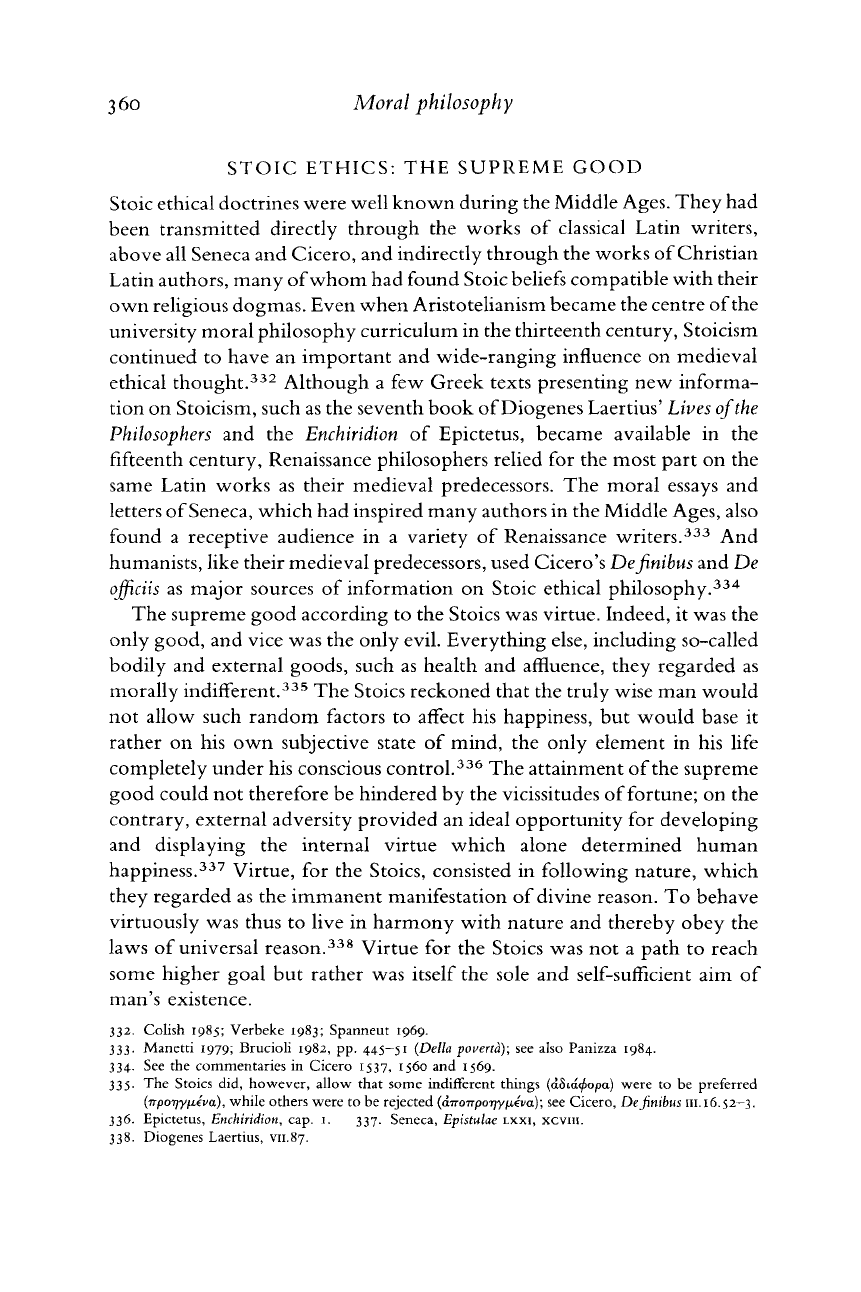
36o
Moral philosophy
STOIC
ETHICS:
THE SUPREME
GOOD
Stoic
ethical doctrines were
well
known during the Middle
Ages.
They had
been
transmitted
directly through the works of classical Latin writers,
above
all Seneca and
Cicero,
and indirectly through the works of Christian
Latin authors, many
of
whom
had found Stoic beliefs compatible with their
own
religious dogmas. Even when Aristotelianism became the centre
of
the
university moral philosophy curriculum in the
thirteenth
century, Stoicism
continued to have an
important
and wide-ranging influence on medieval
ethical thought.
332
Although a few Greek texts presenting new informa-
tion on Stoicism, such as the seventh book
of
Diogenes
Laertius' Lives
of
the
Philosophers and the Enchiridion of Epictetus, became available in the
fifteenth century, Renaissance philosophers relied for the most
part
on the
same Latin works as their medieval predecessors. The moral essays and
letters
of
Seneca,
which had inspired many
authors
in the Middle
Ages,
also
found a receptive audience in a variety of Renaissance writers.
333
And
humanists, like their medieval predecessors, used Cicero's Definihus and De
officiis as major sources of information on Stoic ethical philosophy.
334
The
supreme good according to the Stoics was virtue. Indeed, it was the
only
good, and
vice
was the only
evil.
Everything else, including so-called
bodily
and external goods, such as health and affluence, they regarded as
morally indifferent.
335
The Stoics reckoned
that
the truly wise man would
not allow such random factors to affect his happiness, but would base it
rather
on his own subjective
state
of mind, the only element in his
life
completely
under
his conscious control.
336
The
attainment
of the supreme
good
could not therefore be hindered by the vicissitudes
of
fortune; on the
contrary, external adversity provided an ideal opportunity for developing
and displaying the internal virtue which alone determined human
happiness.
337
Virtue, for the Stoics, consisted in following
nature,
which
they regarded as the immanent manifestation of divine reason. To behave
virtuously was
thus
to
live
in harmony with
nature
and thereby obey the
laws
of universal reason.
338
Virtue for the Stoics was not a
path
to reach
some higher goal but
rather
was itself the sole and self-sufficient aim of
man's existence.
332.
Colish
1985;
Verbeke
1983;
Spanneut
1969.
333.
Manetti
1979;
Bruciori
1982, pp.
445-51
(Della povertà); see
also
Panizza
1984.
334. See the
commentaries
in
Cicero
1537, 1560 and 1569.
335. The
Stoics
did,
however,
allow
that
some
indifferent
things
(àÒtafopa)
were
to be
preferred
(•nporjyixéva),
while
others
were
to be
rejected
(àTTOTrporjyiJLéva); see
Cicero,
Dejìnibus 111.16.52-3.
336.
Epictetus,
Enchiridion, cap. 1. 337.
Seneca,
Epistulae
LXXI, XCVIII.
338.
Diogenes
Laertius,
vn.87.
Cambridge Histories Online © Cambridge University Press, 2008
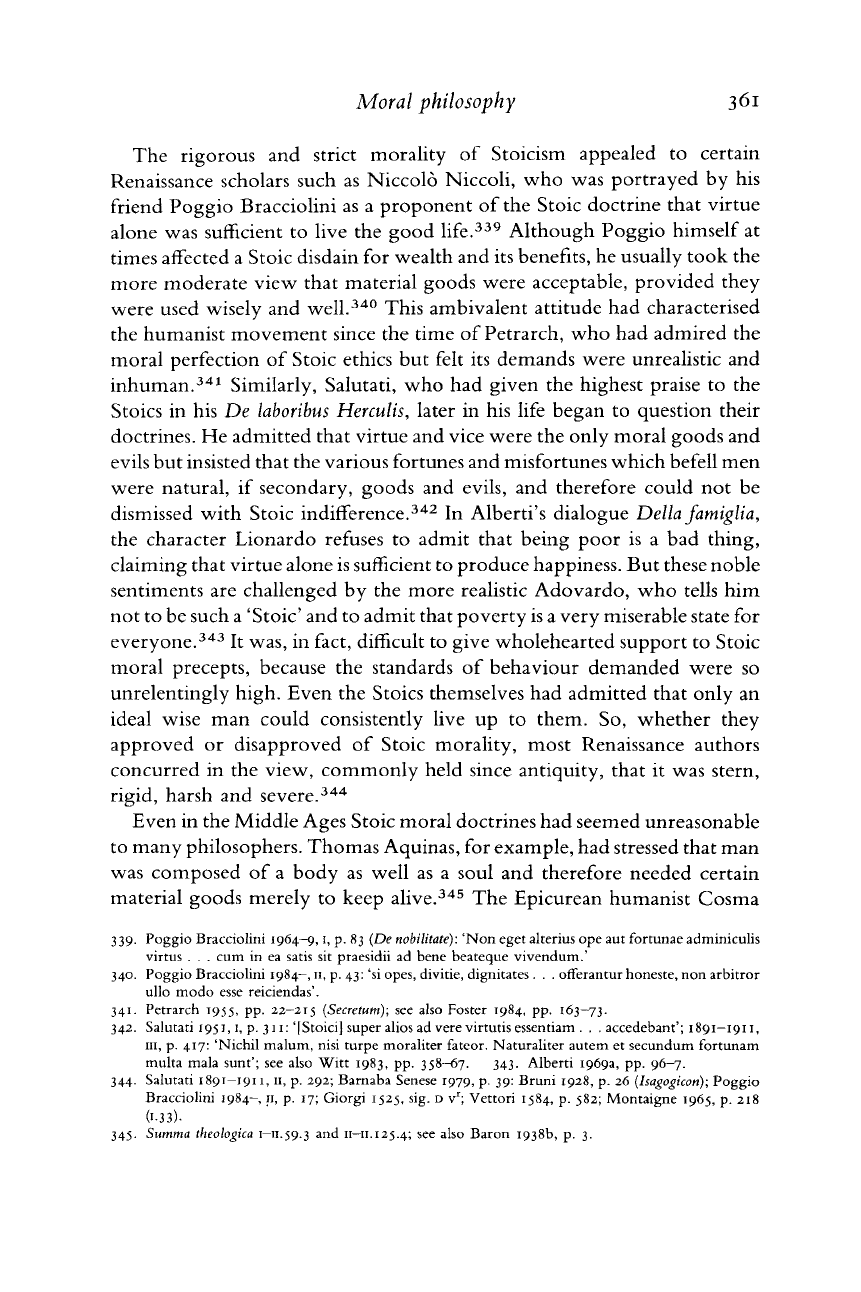
Moral philosophy
The
rigorous and strict morality of Stoicism appealed to certain
Renaissance scholars such as Niccolo
Niccoli,
who was portrayed by his
friend Poggio Bracciolini as a proponent of the Stoic doctrine
that
virtue
alone was sufficient to
live
the good
life.
339
Although Poggio himself at
times affected a Stoic disdain for wealth and its benefits, he usually took the
more moderate
view
that
material goods were acceptable, provided they
were used wisely and
well.
340
This ambivalent
attitude
had characterised
the humanist movement since the time of Petrarch, who had admired the
moral perfection of Stoic ethics but felt its demands were unrealistic and
inhuman.
341
Similarly, Salutati, who had given the highest praise to the
Stoics
in his De laboribus Herculis, later in his
life
began to question their
doctrines. He admitted
that
virtue and
vice
were the only moral goods and
evils
but insisted
that
the various fortunes and misfortunes which befell men
were natural, if secondary, goods and
evils,
and therefore could not be
dismissed with Stoic indifference.
342
In Alberti's dialogue Delia famiglia,
the character Lionardo refuses to admit
that
being poor is a bad thing,
claiming
that
virtue alone is sufficient to produce happiness. But these noble
sentiments are challenged by the more realistic Adovardo, who tells him
not to be such a 'Stoic' and to admit
that
poverty is a very miserable state for
everyone.
343
It was, in fact, difficult to
give
wholehearted support to Stoic
moral precepts, because the standards of behaviour demanded were so
unrelentingly high. Even the Stoics themselves had admitted
that
only an
ideal wise man could consistently
live
up to them. So, whether they
approved or disapproved of Stoic morality, most Renaissance authors
concurred in the
view,
commonly held since antiquity,
that
it was stern,
rigid, harsh and severe.
344
Even
in the Middle
Ages
Stoic moral doctrines had seemed unreasonable
to many philosophers. Thomas Aquinas, for example, had stressed
that
man
was
composed of a body as
well
as a soul and therefore needed certain
material goods merely to keep alive.
345
The Epicurean humanist Cosma
339.
Poggio
Bracciolini
1964—9,1,
p. 83 (De nobilitate): 'Non
eget
alterius
ope aut
fortunae
adminiculis
virtus
. . . cum in ea
satis
sit
praesidii
ad
bene
beateque
vivendum.'
340.
Poggio
Bracciolini
1984-,
11, p. 43: 'si
opes,
divitie,
dignitates
. . .
ofFerantur
honeste,
non
arbitror
ullo
modo
esse
reiciendas'.
341.
Petrarch
1955, pp.
22-215
(Secretum); see
also
Foster
1984, pp.
163-73.
342.
Salutati
1951,1, p. 311:
'[Stoici]
super
alios
ad
vere
virtutis
essentiam
. . .
accedebant';
1891—1911,
in, p. 417:
'Nichil
malum,
nisi
turpe
moraliter
fateor.
Naturaliter
autem
et
secundum
fortunam
multa
mala
sunt';
see
also
Witt
1983, pp.
358—67.
343.
Alberti
1969a,
pp.
96—7.
344.
Salutati
1891-1911,11, p. 292;
Barnaba
Senese
1979, p. 39:
Bruni
1928, p. 26 (Isagogicon);
Poggio
Bracciolini
1984- n
5
P- 17;
Giorgi
1525, sig. D v
r
;
Vettori
1584, p. 582;
Montaigne
1965, p. 218
(i-33).
345.
Summa
theologica 1—11.59.3 and 11—11.125.4;
see
a
ls°
Baron
1938b,
p. 3.
Cambridge Histories Online © Cambridge University Press, 2008
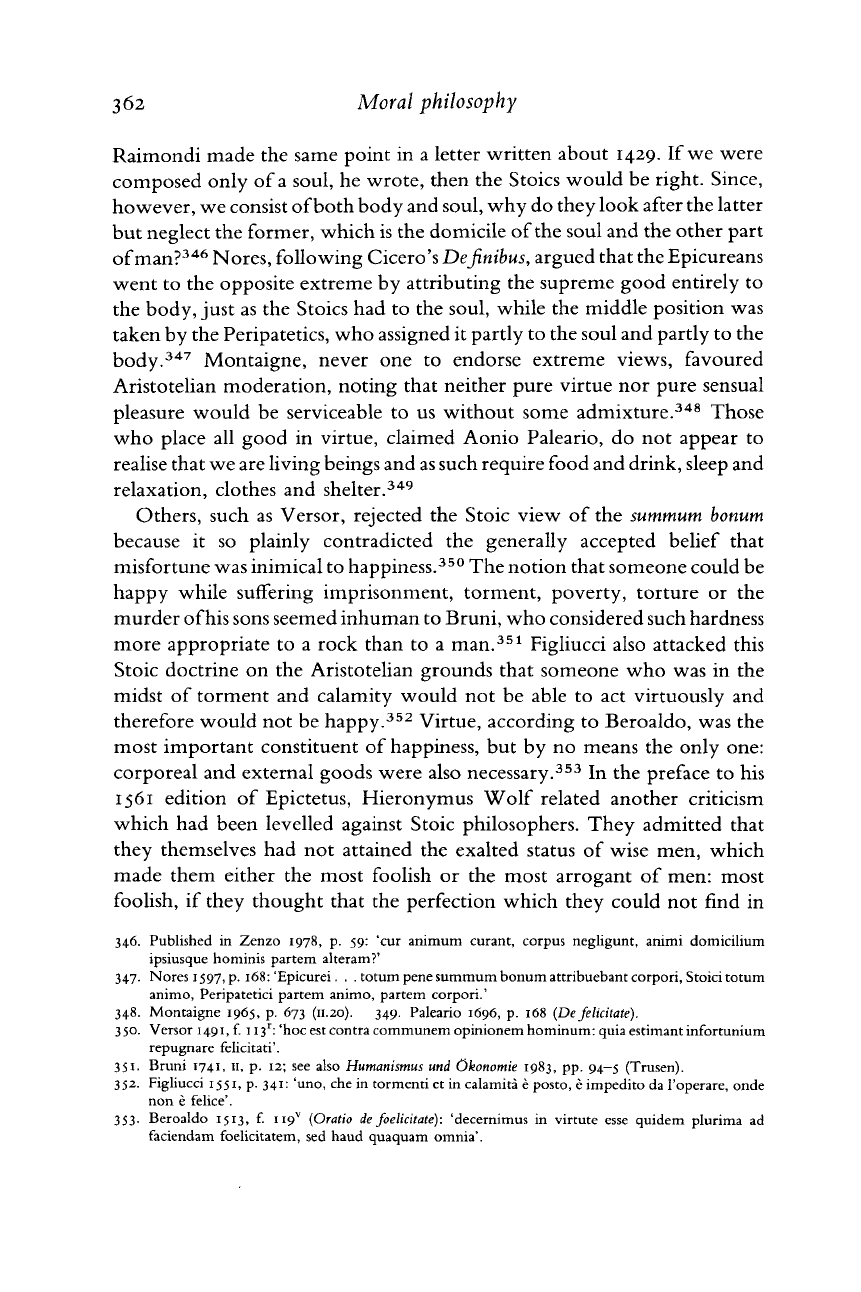
Moral philosophy
Raimondi made
the
same point
in a
letter written about 1429.
If
we were
composed only
of a
soul,
he
wrote, then
the
Stoics would
be
right. Since,
however,
we
consist
of
both body
and
soul, why
do
they look after
the
latter
but neglect
the
former, which
is the
domicile
of
the soul
and the
other
part
of
man?
346
Nores, following Cicero's Definibus, argued
that
the
Epicureans
went
to the
opposite extreme
by
attributing
the
supreme good entirely
to
the body, just
as the
Stoics
had to the
soul, while
the
middle position
was
taken
by the
Peripatetics,
who
assigned
it
partly
to the
soul
and
partly
to the
body.
347
Montaigne, never
one to
endorse extreme
views,
favoured
Aristotelian moderation, noting
that
neither pure virtue
nor
pure sensual
pleasure would
be
serviceable
to us
without some admixture.
348
Those
who
place
all
good
in
virtue, claimed Aonio Paleario,
do not
appear
to
realise
that
we are
living beings
and as
such require food
and
drink, sleep
and
relaxation, clothes
and
shelter.
349
Others, such
as
Versor, rejected
the
Stoic
view
of the summum
bonum
because
it so
plainly contradicted
the
generally accepted belief
that
misfortune was inimical
to
happiness.
350
The notion
that
someone could
be
happy while suffering imprisonment, torment, poverty,
torture
or the
murder
of
his sons seemed inhuman
to
Bruni,
who
considered such hardness
more appropriate
to a
rock
than
to a
man.
351
Figliucci also attacked this
Stoic
doctrine
on the
Aristotelian grounds
that
someone
who was in the
midst
of
torment
and
calamity would
not be
able
to act
virtuously
and
therefore would
not be
happy.
352
Virtue, according
to
Beroaldo,
was the
most important constituent
of
happiness,
but by no
means
the
only
one:
corporeal
and
external goods were also necessary.
353
In the
preface
to his
1561
edition
of
Epictetus, Hieronymus
Wolf
related another criticism
which
had
been levelled against Stoic philosophers. They admitted
that
they themselves
had not
attained
the
exalted status
of
wise
men,
which
made them either
the
most foolish
or the
most arrogant
of men:
most
foolish,
if
they thought
that
the
perfection which they could
not
find
in
346. Published in Zenzo 1978, p. 59: 'cur animum curant, corpus negligunt, animi domicilium
ipsiusque hominis partem alteram?'
347. Nores 1597, p. 168: 'Epicurei. . . totum pene summum bonum attribuebant corpori, Stoici totum
animo, Peripatetici partem animo, partem corpori.'
348. Montaigne 1965, p. 673 (11.20). 349. Paleario 1696, p. 168 (De
felicitate).
350. Versor 1491, f.
113
r
:
'hoc est contra communem opinionem hominum: quia estimant infortunium
repugnare
felicitati'.
351.
Bruni 1741, 11, p. 12; see
also
Humanismus
und
Ökonomie
1983, pp. 94-5 (Trusen).
352.
Figliucci 1551, p. 341: 'uno, che in tormenti et in calamita e posto, e impedito da l'operare, onde
non e felice'.
353.
Beroaldo 1513, £ H9
V
(Oratio
de
foelicitate):
'decernimus in virtute
esse
quidem plurima ad
faciendam foelicitatem, sed haud quaquam omnia'.
Cambridge Histories Online © Cambridge University Press, 2008
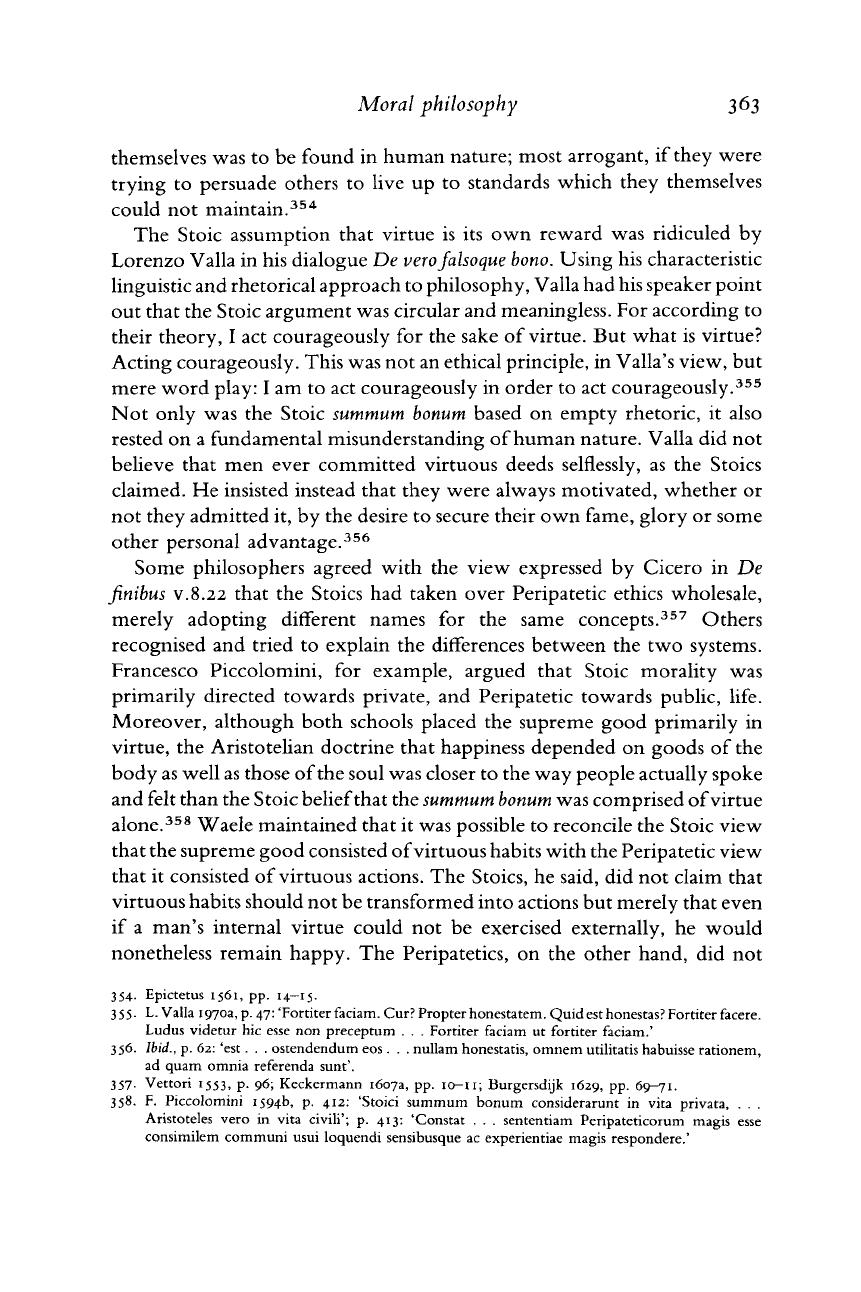
Moral philosophy
themselves
was
to be
found
in
human nature; most arrogant,
if
they were
trying
to
persuade others
to
live
up to
standards which they themselves
could
not
maintain.
354
The
Stoic assumption
that
virtue
is its own
reward
was
ridiculed
by
Lorenzo
Valla
in
his dialogue
De
vero falso que bono. Using his characteristic
linguistic
and rhetorical approach
to
philosophy,
Valla
had his speaker point
out
that
the
Stoic argument was circular and meaningless. For according
to
their theory,
I act
courageously
for the
sake
of
virtue.
But
what
is
virtue?
Acting
courageously. This was
not an
ethical principle,
in
Valla's
view,
but
mere word play:
I am to act
courageously
in
order
to act
courageously.
355
Not
only
was the
Stoic
summum
bonum based
on
empty rhetoric,
it
also
rested
on a
fundamental misunderstanding of human nature.
Valla
did not
believe
that
men
ever committed virtuous deeds selflessly,
as the
Stoics
claimed.
He
insisted instead
that
they were always motivated, whether
or
not they admitted
it, by the
desire
to
secure their own fame, glory
or
some
other personal advantage.
356
Some
philosophers agreed with
the
view
expressed
by
Cicero
in De
jinibus v.8.22
that
the
Stoics
had
taken over Peripatetic ethics wholesale,
merely
adopting different names
for the
same concepts.
357
Others
recognised
and
tried
to
explain
the
differences between
the two
systems.
Francesco
Piccolomini,
for
example, argued
that
Stoic morality
was
primarily directed towards private,
and
Peripatetic towards public,
life.
Moreover,
although both schools placed
the
supreme good primarily
in
virtue,
the
Aristotelian doctrine
that
happiness depended
on
goods
of the
body
as
well
as those
of
the soul was closer
to the
way people actually spoke
and felt than the Stoic
belief
that
the
summum
bonum was comprised
of
virtue
alone.
358
Waele maintained
that
it
was possible
to
reconcile
the
Stoic
view
that
the supreme good consisted
of
virtuous habits with the Peripatetic
view
that
it
consisted of virtuous actions.
The
Stoics,
he
said,
did not
claim
that
virtuous habits should not
be
transformed into actions
but
merely
that
even
if
a
man's internal virtue could
not be
exercised externally,
he
would
nonetheless remain happy.
The
Peripatetics,
on the
other hand,
did not
354.
Epictetus
1561, pp.
14-15.
355.
L.
Valla
1970a,
p. 47:
'Fortiter
faciam.
Cur?
Propter
honestatern.
Quid
est
honestas?
Fortiter
facere.
Ludus
videtur
hie esse non
preceptum
. . .
Fortiter
faciam
ut
fortiter
faciam.'
356. Ibid.,
p. 62: 'est. . .
ostendendum
eos . . .
nullam
honestatis,
omnem
utilitatis
habuisse
rationem,
ad
quam
omnia
referenda
sunt'.
357.
Vettori
1553, p. 96;
Keckermann
1607a,
pp.
10-11;
Burgersdijk
1629, pp.
69-71.
358.
F.
Piccolomini
1594b,
p. 412:
'Stoici
summum
bonum
considerarunt
in
vita
privata,
. . .
Aristoteles
vero
in
vita
civili';
p. 413:
'Constat
. . .
sententiam
Peripateticorum
magis
esse
consimilem
communi
usui
loquendi
sensibusque
ac
experientiae
magis
respondere.'
Cambridge Histories Online © Cambridge University Press, 2008
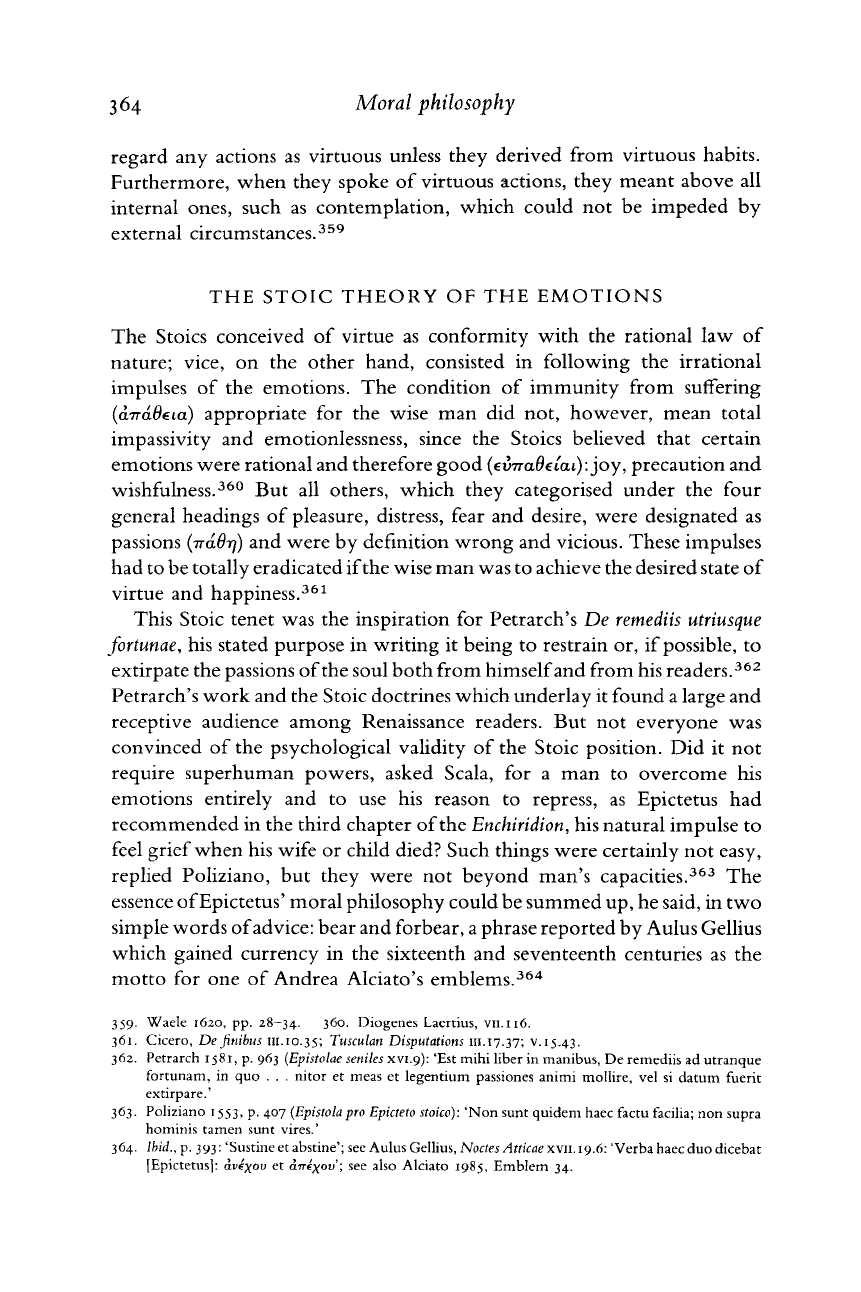
Moral philosophy
regard
any
actions
as
virtuous unless they derived from virtuous habits.
Furthermore, when they spoke
of
virtuous actions, they meant above
all
internal ones, such
as
contemplation, which could
not be
impeded
by
external circumstances.
359
THE
STOIC
THEORY
OF THE
EMOTIONS
The
Stoics conceived
of
virtue
as
conformity with
the
rational
law of
nature;
vice,
on the
other hand, consisted
in
following
the
irrational
impulses
of the
emotions.
The
condition
of
immunity from suffering
(a7ra#eia)
appropriate
for the
wise
man did not,
however, mean total
impassivity
and
emotionlessness, since
the
Stoics believed
that
certain
emotions were rational
and
therefore good (evTradeicu): joy, precaution
and
wishfulness.
360
But all
others, which they categorised under
the
four
general headings
of
pleasure, distress, fear
and
desire, were designated
as
passions
(jTadif])
and
were
by
definition wrong
and
vicious.
These impulses
had
to be
totally eradicated
if
the wise
man
was
to
achieve
the
desired state
of
virtue
and
happiness.
361
This
Stoic tenet
was the
inspiration
for
Petrarch's
De
remediis utriusque
fortunae,
his
stated purpose
in
writing
it
being
to
restrain
or, if
possible,
to
extirpate
the
passions
of
the soul both from
himself
and from
his
readers.
362
Petrarch's work
and the
Stoic doctrines which underlay
it
found
a
large
and
receptive
audience among Renaissance readers.
But not
everyone
was
convinced
of the
psychological validity
of the
Stoic position.
Did it not
require superhuman powers, asked Scala,
for a man to
overcome
his
emotions entirely
and to use his
reason
to
repress,
as
Epictetus
had
recommended
in the
third
chapter
of
the Enchiridion,
his
natural impulse
to
feel grief
when
his
wife
or
child died? Such things were certainly
not
easy,
replied Poliziano,
but
they were
not
beyond man's capacities.
363
The
essence
of
Epictetus' moral philosophy could
be
summed
up, he
said,
in two
simple words
of
advice:
bear
and
forbear,
a
phrase reported
by
Aulus Gellius
which
gained currency
in the
sixteenth
and
seventeenth centuries
as the
motto
for one of
Andrea
Alciato's
emblems.
364
359. Waele 1620, pp.
28-34.
36o. Diogenes Laertius,
vn.116.
361.
Cicero, De
finibus
ill.10.35;
Tusculan Disputations
IN.
17.37; V-I5-43-
362. Petrarch 1581, p. 963
(Epistolae seniles
xvi.9): 'Est mihi liber in manibus, De remediis ad utranque
fortunam, in quo . . . nitor et meas et legentium
passiones
animi mollire, vel si datum fuerit
extirpare.'
363. Poliziano
1553»
P- 407
(Epistolapro Epicteto stoico):
'Non sunt quidem haec factu facilia; non supra
hominis tamen sunt vires.'
364.
Ibid.,
p. 393: 'Sustine et abstine'; see Aulus Gellius,
Noctes Atticaexvn.19.6:
'Verba haec duo dicebat
[Epictetus]:
avexov
et
arnixov;
see
also
Alciato 1985, Emblem 34.
Cambridge Histories Online © Cambridge University Press, 2008
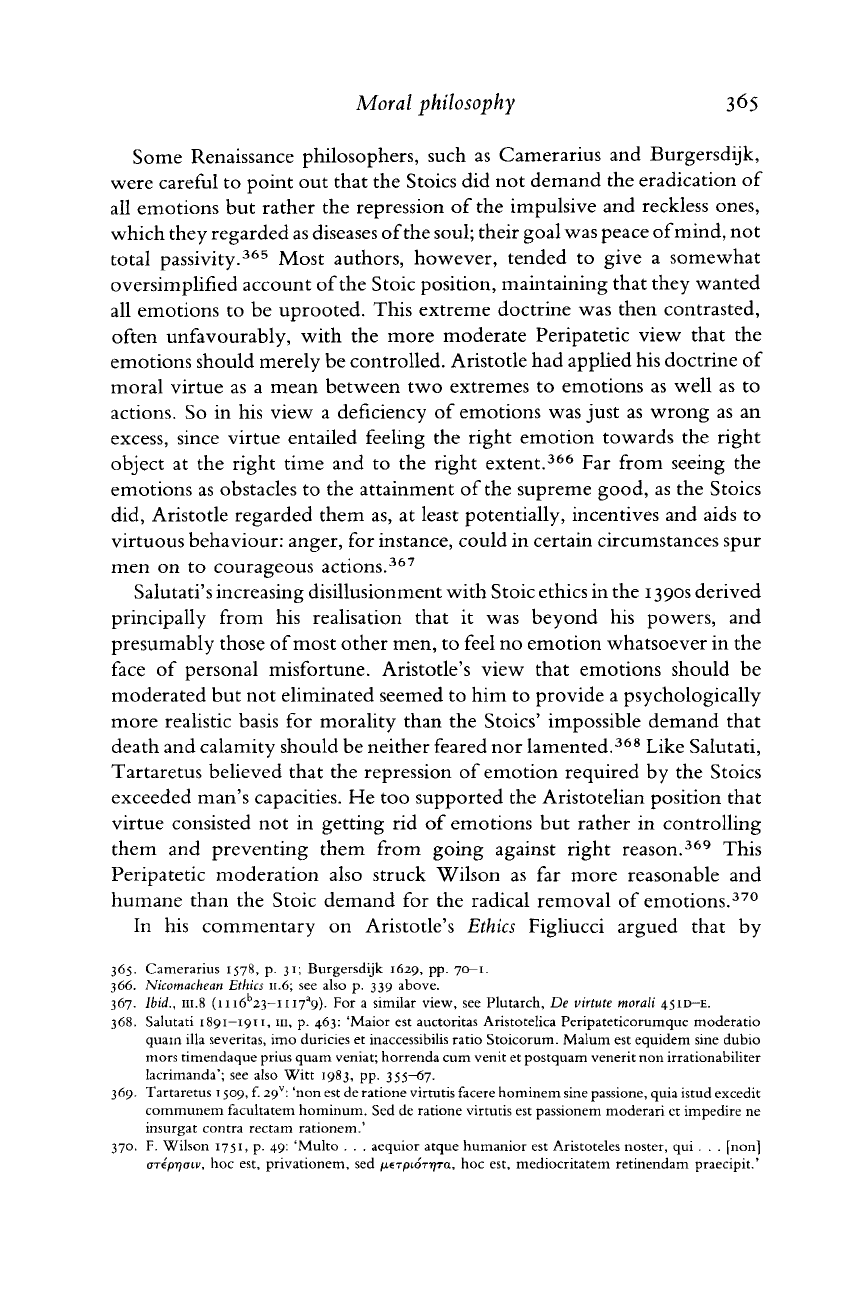
Moral philosophy
Some
Renaissance philosophers, such
as
Camerarius
and
Burgersdijk,
were
careful
to
point
out
that
the
Stoics
did not
demand
the
eradication
of
all
emotions
but
rather
the
repression
of the
impulsive
and
reckless ones,
which
they regarded as diseases
of
the soul; their goal was peace
of
mind,
not
total passivity.
365
Most authors, however, tended
to
give
a
somewhat
oversimplified
account
of
the Stoic position, maintaining
that
they wanted
all
emotions
to be
uprooted. This extreme doctrine
was
then
contrasted,
often
unfavourably, with
the
more moderate Peripatetic
view
that
the
emotions should merely
be
controlled. Aristotle
had
applied his doctrine
of
moral virtue
as a
mean between
two
extremes
to
emotions
as
well
as to
actions.
So in his
view
a
deficiency
of
emotions was just
as
wrong
as an
excess,
since virtue entailed feeling
the
right emotion towards
the
right
object
at the
right time
and to the
right extent.
366
Far
from seeing
the
emotions
as
obstacles
to the
attainment
of
the supreme good,
as the
Stoics
did, Aristotle regarded them
as, at
least potentially, incentives
and
aids
to
virtuous behaviour: anger,
for
instance, could
in
certain circumstances spur
men
on to
courageous actions.
367
Salutati's increasing disillusionment with Stoic ethics
in the
1390s derived
principally
from
his
realisation
that
it was
beyond
his
powers,
and
presumably those
of
most other men,
to
feel
no
emotion whatsoever
in the
face
of
personal misfortune. Aristotle's
view
that
emotions should
be
moderated
but not
eliminated seemed
to him to
provide
a
psychologically
more realistic basis
for
morality
than
the
Stoics'
impossible demand
that
death
and
calamity should
be
neither feared
nor
lamented.
368
Like
Salutati,
Tartaretus believed
that
the
repression
of
emotion required
by the
Stoics
exceeded
man's capacities.
He too
supported
the
Aristotelian position
that
virtue consisted
not in
getting
rid of
emotions
but
rather
in
controlling
them
and
preventing them from going against right reason.
369
This
Peripatetic moderation also struck Wilson
as far
more reasonable
and
humane
than
the
Stoic demand
for the
radical removal
of
emotions.
370
In
his
commentary
on
Aristotle's Ethics
Figliucci
argued
that
by
365. Camerarius 1578, p. 31; Burgersdijk 1629, pp. 70—1.
366.
Nicomachean
Ethics
11.6; see
also
p. 339 above.
367.
Ibid.,
in.8 (iii6
b
23-ni7
a
9). For a similar view, see Plutarch, De virtute
morali
451D-E.
368. Salutati
1891-1911,
in, p. 463: 'Maior est auctoritas Aristotelica Peripateticorumque moderatio
quain ilia seVeritas, imo duricies et inaccessibilis ratio Stoicorum. Malum est equidem
sine
dubio
mors timendaque prius quam veniat; horrenda cum venit et postquam venerit non irrationabiliter
lacrimanda';
see
also
Witt 1983, pp. 355—67.
369. Tartaretus 1509, f. 29
v
: 'non est de ratione virtutis facere hominem
sine
passione, quia istud excedit
communem facultatem hominum. Sed de ratione virtutis est passionem moderari et impedire ne
insurgat contra rectam rationem.'
370. F. Wilson 1751, p. 49: 'Multo . . . aequior atque humanior est Aristoteles noster, qui . . . [non]
oreprjcuv,
hoc est, privationem, sed
/Lterptor^Ta,
hoc est, mediocritatem retinendam praecipit.'
Cambridge Histories Online © Cambridge University Press, 2008
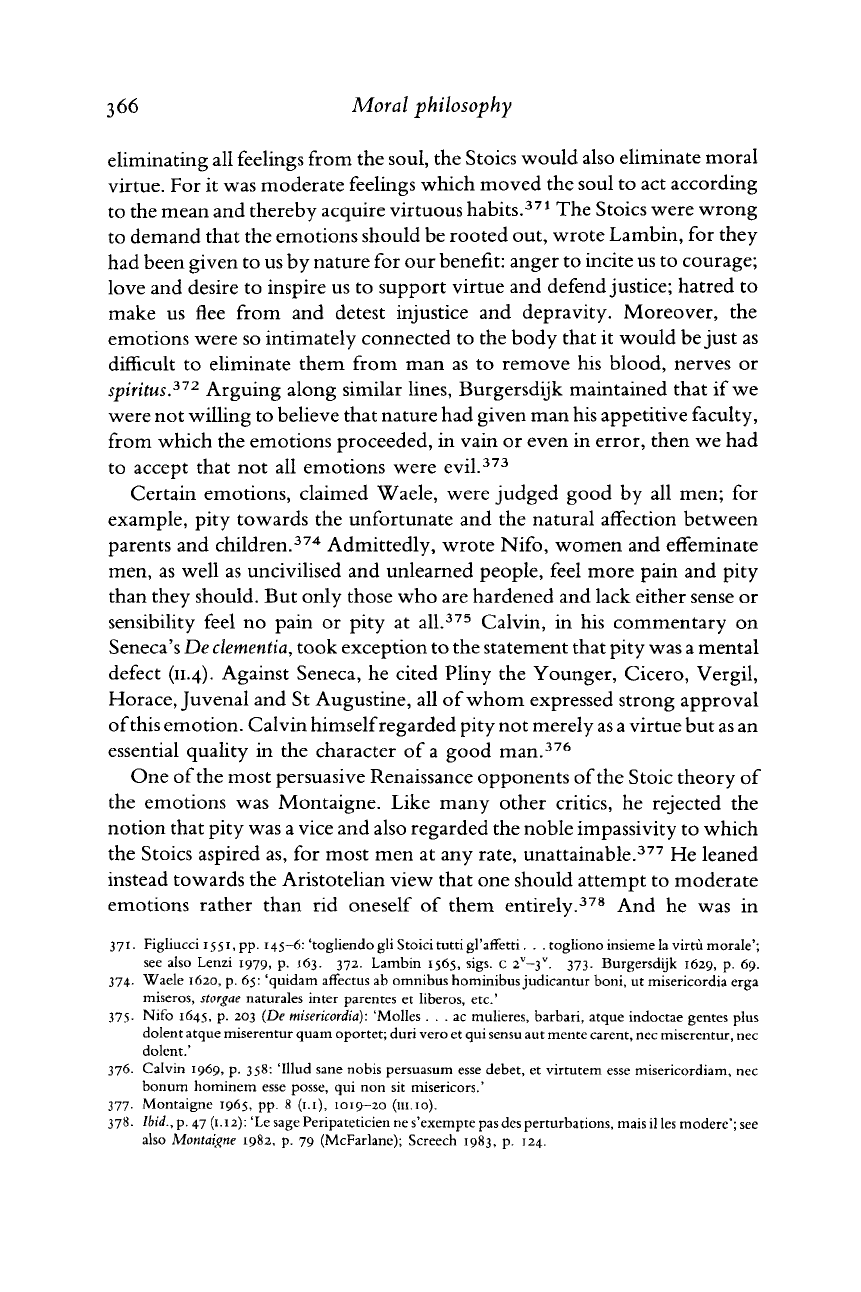
366 Moral philosophy
eliminating
all
feelings from
the
soul,
the
Stoics would also eliminate moral
virtue.
For it was
moderate feelings which moved
the
soul
to act
according
to
the
mean
and
thereby acquire virtuous habits.
371
The
Stoics were wrong
to demand
that
the
emotions should
be
rooted
out,
wrote Lambin,
for
they
had been given
to us by
nature
for our
benefit: anger
to
incite
us to
courage;
love
and
desire
to
inspire
us to
support virtue
and
defend justice; hatred
to
make
us
flee from
and
detest injustice
and
depravity. Moreover,
the
emotions were
so
intimately connected
to the
body
that
it
would be just
as
difficult
to
eliminate them from
man as to
remove
his
blood, nerves
or
spiritus.
372
Arguing along similar lines, Burgersdijk maintained
that
if we
were
not
willing
to
believe
that
nature
had
given
man his
appetitive faculty,
from which
the
emotions proceeded,
in
vain
or
even
in
error, then
we had
to accept
that
not all
emotions were
evil.
373
Certain emotions, claimed Waele, were judged good
by all men; for
example,
pity towards
the
unfortunate
and the
natural affection between
parents
and
children.
374
Admittedly, wrote
Nifo,
women
and
effeminate
men,
as
well
as
uncivilised
and
unlearned people,
feel
more pain
and
pity
than
they should.
But
only those
who are
hardened
and
lack either sense
or
sensibility
feel
no
pain
or
pity
at
all.
375
Calvin,
in his
commentary
on
Seneca's
De
dementia, took exception
to the
statement
that
pity was
a
mental
defect
(11.4).
Against Seneca,
he
cited Pliny
the
Younger,
Cicero,
Vergil,
Horace, Juvenal
and St
Augustine,
all of
whom expressed strong approval
of
this emotion.
Calvin
himself
regarded pity
not
merely as
a
virtue
but
as
an
essential quality
in the
character
of a
good man.
376
One
of
the most persuasive Renaissance opponents
of
the Stoic theory
of
the emotions
was
Montaigne. Like many other critics,
he
rejected
the
notion
that
pity was
a
vice
and
also regarded
the
noble impassivity
to
which
the Stoics aspired
as, for
most
men at any
rate, unattainable.
377
He
leaned
instead towards
the
Aristotelian
view
that
one
should attempt
to
moderate
emotions
rather
than
rid
oneself
of
them entirely.
378
And he was in
371.
Figliucci 1551, pp. 145-6:'togliendogliStoicituttigl'arTetti. . . togliono insieme la virtu morale';
see also Lenzi 1979, p. 163. 372. Lambin 1565, sigs. с 2
V
~3
V
. 373. Burgersdijk 1629, p. 69.
374.
Waele 1620, p. 65: 'quidam afFectus ab omnibus hominibus judicantur boni, ut misericordia erga
miseros,
storgae
naturales inter parentes et liberos, etc'
375.
Nifo 1645, p. 203 (De
misericordia):
'Molles . . . ac mulieres, barbari, atque indoctae gentes plus
dolent atque miserentur quam oportet; duri vero et qui
sensu
aut mente carent, nec miserentur, nec
dolent.'
376.
Calvin
1969, p- 358: 'Illud sane nobis persuasum
esse
debet, et virtutem
esse
misericordiam, nec
bonum hominem
esse
posse, qui non sit misericors.'
377.
Montaigne 1965, pp. 8
(1.1),
1019-20 (шло).
378. Ibid.,
p. 47
(1.12):
'Le sage Peripateticien ne s'exempte pas des perturbations, mais il les modere'; see
also
Montaigne
1982, p. 79 (McFarlane); Screech 1983, p. 124.
Cambridge Histories Online © Cambridge University Press, 2008
